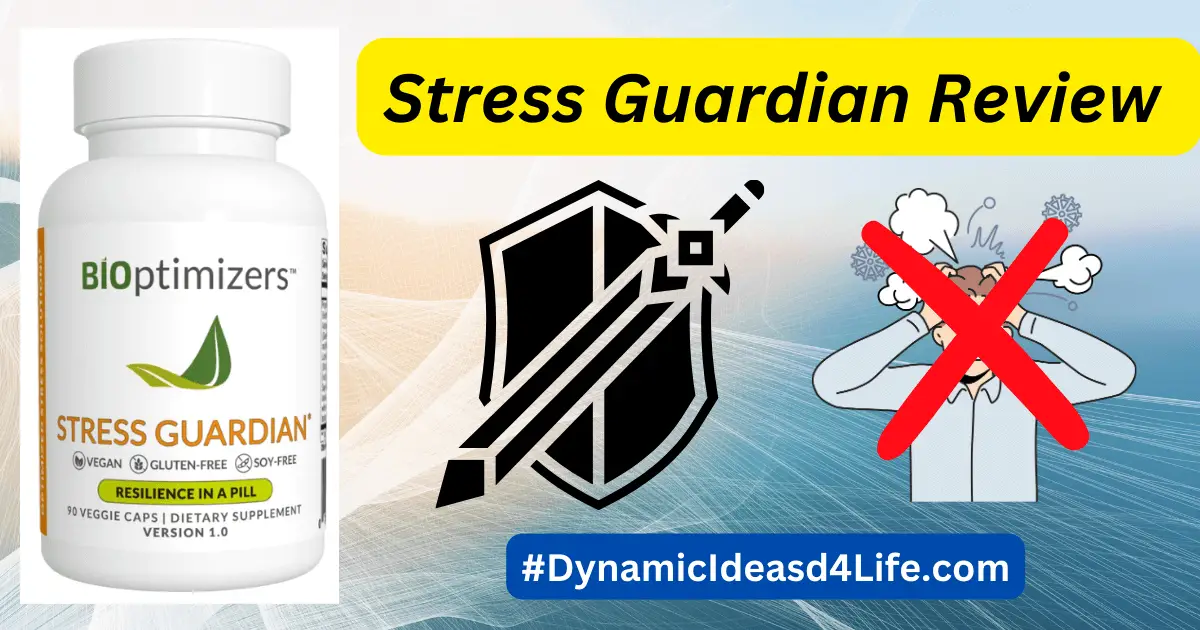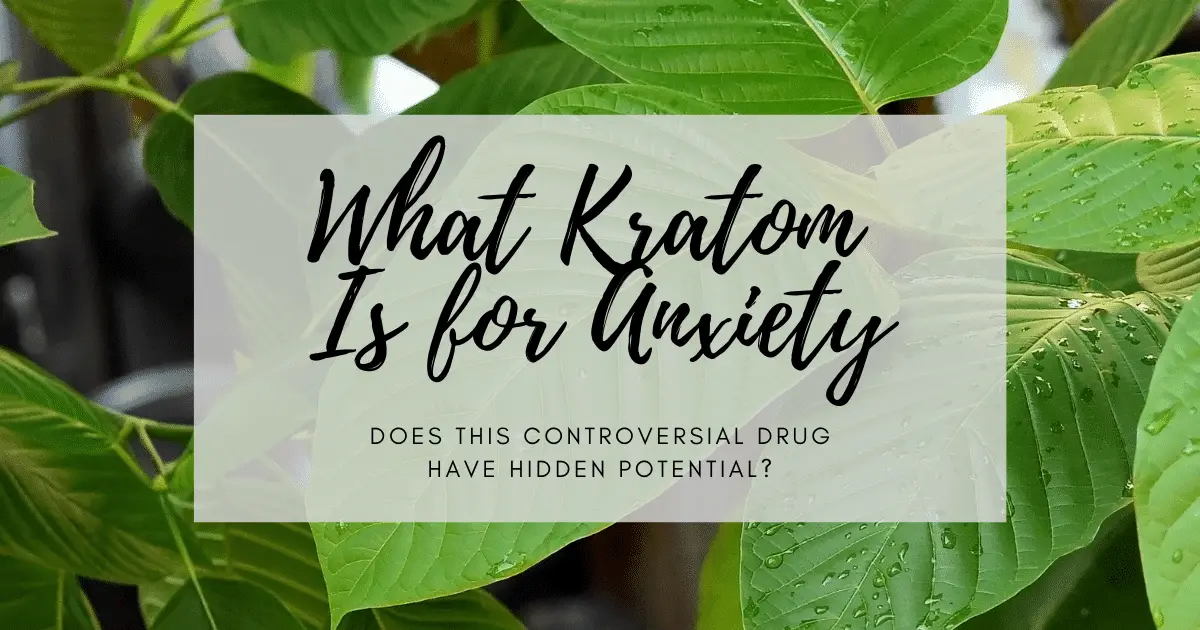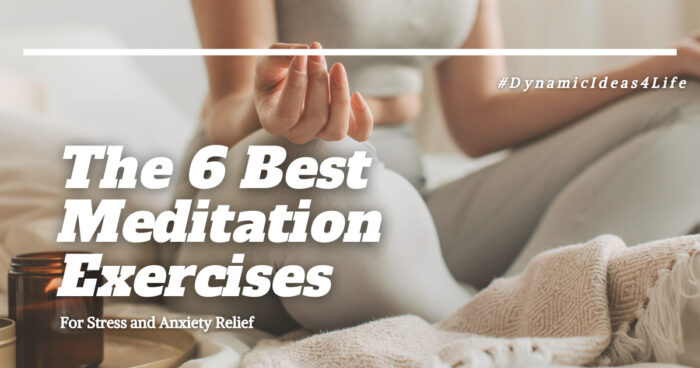Are you looking for the Best Meditation Exercises For Stress and Anxiety Relief? Both conditions I know can be very difficult to deal with (even at the best of times). It is estimated that in the USA alone about 1/3 of the population suffer from either stress or anxiety, and roughly about half of these people are not actively seeking treatment. (1) (2)
So, Meditation is a very ancient spiritual practice with many known benefits for many different things.
In the modern age, even mainstream practitioners recommend Meditation as a type of therapy for several physical and mental health conditions including both Stress and Anxiety.
Although Meditation is not your typical treatment for either. Usually, it is recommended to make lifestyle changes, dietary changes, and even medication may be prescribed in some cases to help relieve these conditions.
However, Practicing Meditation Exercises should not be overlooked as this can have a profound effect on any kind of mental health condition. In fact, it can also have numerous benefits for many physical health conditions too, with quite surprising results.
But as for Meditation Exercises for Stress and Anxiety… let’s take a look at this.
What Are The 6 Best Meditation Exercises
For Stress and Anxiety Relief
It is true – the world that we live in is a very demanding place that can often leave us feeling overwhelmed, stressed, and anxious. Our society seems to be set up this way so stress and anxiety are natural repercussions of many everyday situations.
But thankfully, Meditation offers a powerful tool to find inner peace, reduce stress, and manage anxiety.
By incorporating Meditation Exercises into your daily routine, you can cultivate a calm and focused mind, leading to improved well-being and a deeper sense of mental strength through difficult times.
In this blog post, we will explore the six best meditation exercises specifically designed to combat stress and anxiety.
These exercises can be practiced by beginners and experienced meditators alike, allowing you to embark on a transformative journey toward greater mental and emotional balance.
We hope you find this information helpful. For anyone who’d like to learn more please keep reading below…
Understanding the Benefits of Meditation Exercises
for Stress and Anxiety
Meditation is a powerful practice that offers numerous benefits for managing stress and anxiety. Many everyday situations can skyrocket stress levels, and anxiety can be triggered in a whole host of different ways. [R]
However, through regular Meditation, individuals can find relief and develop greater mental and emotional balance.
Meditation helps reduce stress by activating the relaxation response in the body, lowering cortisol levels, and promoting a sense of calm and relaxation.
By cultivating present-moment awareness, Meditation allows individuals to detach from anxious thoughts and find peace in the present.
It also enhances emotional resilience by developing a greater capacity to cope with challenging emotions.
For this One of the Notable Benefits of Meditation is Improved Focus and Concentration.
By training the mind to remain focused on a chosen object of attention, such as the breath, Meditation strengthens neural pathways associated with concentration.
This leads to reduced mental clutter and a better ability to handle stressful situations with a clear and focused mind.
Regular Meditation practice fosters self-awareness, allowing individuals to gain deeper insights into their thoughts, emotions, and patterns of behavior.
This heightened self-awareness helps identify stress triggers to implement healthy coping strategies, leading to positive changes and greater emotional resilience.
It is definitely something that (if you practice regularly enough) can yield incredible results but most people’s trouble is knowing where and how to get started.
But this is exactly what this post is for so let’s continue with the 1st exercise…
i.) Mindfulness Meditation:
The Foundation for Stress and Anxiety Relief
For those unfamiliar Mindfulness Meditation is a fundamental practice that involves intentionally paying attention to the present moment without judgment. It allows us to observe our thoughts and emotions, creating a space for greater self-awareness and reducing stress reactivity.
To begin, find a quiet space, sit comfortably, and focus on your breath.
As thoughts arise, acknowledge them without judgment and gently bring your attention back to the breath.
Gradually, expand your practice by incorporating longer sessions and integrating mindfulness into daily activities.
*Note one trick I have found that helps me is counting and if anything distracts me from my meditation I start counting again from 0. This helped me in the beginning and I definitely recommend it*
>>>Check Out This Video Below For an Idea of What a Short 5 Minute Meditation Involves<<<
Hopefully, this helps but there are a few things that you can try here.
- Mindful eating & Mindful Walking, are two good examples that can help extend the benefits of Mindfulness Meditation throughout your day.
Just bear in mind that Mindfulness is a skill that develops over time, so be patient with yourself as you navigate this journey.
With regular practice, Mindfulness Meditation can become a powerful tool for reducing stress, managing anxiety, and cultivating a greater sense of inner peace and well-being.
So, find a quiet moment, take a deep breath, and embark on this transformative path to a calmer and more balanced life.
*Mindfulness is a great way for dealing with Stress and Anxiety but another Good Exercise to try is…
II. Loving-Kindness Meditation:
Cultivating Compassion for Yourself and Others
Known to Buddhists as Maitrī Loving-Kindness Meditation involves directing positive and compassionate intentions toward oneself, loved ones, and even those with whom we may have difficulty.
By generating feelings of love and kindness, this practice nurtures empathy, reduces self-criticism, and enhances social connections.
Start by finding a comfortable posture, closing your eyes, and repeating phrases of well-wishing towards yourself and others. As you progress, you can extend these wishes to broader communities and even to all beings.
For Stress and Anxiety, these exercises can help by bringing more inner peace to oneself and less self-loathing which can contribute to many precursors of these conditions.
I will let you conclude your own research here as there is much to cover in this post but now moving on…
III. Body Scan Meditation:
Deepening the Mind-Body Connection
Practicing the Body Scan Meditation brings attention to each part of the body, promoting relaxation and deepening the mind-body connection.
It helps release tension and enhances body awareness, which is often compromised by Stress and Anxiety.
Begin by lying down or sitting in a comfortable position and systematically bring your attention to different areas of your body, noticing sensations without judgment.
This practice cultivates a sense of relaxation and grounding. Learn more in the video below;
There are many mental health benefits that come from practicing Body Scan Meditation. Not only does this help individuals develop a mindful connection with their bodies, fostering a sense of acceptance and compassion towards physical sensations but it also helps deter the mind away from negative feelings and emotions.
By consciously observing and releasing tension or discomfort, body scan meditation provides a powerful tool for reducing stress and anxiety, promoting a harmonious balance between the mind and body.
In fact, this is very much like Exercise #4 which we will share below…
IV. Breathing Exercises:
Harnessing the Power of the Breath For Greater Relaxation
For those that suffer from Stress or Anxiety (or both together), breathing exercises can be a great tool.
Our breath serves as a powerful anchor in Meditation, allowing us to regulate our emotions and activate the body’s relaxation response.
Diaphragmatic Breathing, also known as belly breathing, involves deepening and slowing down the breath to promote relaxation. This can be incredibly beneficial as by focusing on the movement of the diaphragm, you can release tension and bring a sense of calm to the mind.
Nostril Breathing is another very effective technique. Alongside Diaphragmatic Breathing, this can be very good for circulating the body’s oxygen supply and can be a great way to balance the body’s energy.
*These breathing exercises you can practice alongside any type of meditation exercise including the next one.
V. Walking Meditation For Stress and Anxiety

Walking Meditation is an interesting one as this offers a unique opportunity to cultivate mindfulness and find calmness in motion.
It involves intentionally bringing awareness to the sensations of walking, such as the feeling of the feet touching the ground or the rhythm of the breath.
To begin with this exercise – Find a quiet space outdoors, set a slow pace, and pay attention to each step.
If your mind wanders, gently redirect your focus back to the movement of your body.
It can be easy to become distracted by your surroundings but once you can lock your focus into your movements you will know once your mind enters into its meditative state.
But ultimately, Walking Meditation can be a refreshing way to integrate mindfulness into your daily routine.
It is a great way for tuning into the natural world and for dealing with stress and anxiety. The peace and quiet of any kind of walking around the right kind of places can be very profound, and many can practice walking meditation without even trying.
Tibetan Monks and others practice Walking Meditation daily without fail and here is something else…
Our last pick…
VI. Transcendental Meditation:
Delving into the Deep States of Relaxation

Transcendental Meditation (TM) is a technique that involves the use of a personal mantra to help the mind effortlessly transcend into deep states of relaxation and inner peace.
By repeating the mantra silently, TM practitioners experience a state of restful alertness, allowing the mind to settle and release stress and anxiety.
The process of receiving a TM mantra involves working with a certified TM teacher who guides individuals in a personalized session. During this session, a specific mantra is assigned based on personal suitability.
The mantra is kept private and is used as a focal point during meditation practice.
Transcendental Meditation has been extensively researched and has shown significant efficacy in reducing stress and anxiety. Studies have indicated that regular TM practice leads to decreased cortisol levels, improved cardiovascular health, reduced symptoms of anxiety and depression, and increased overall well-being.
Now all 6 of these exercises are worth looking into but with this out of the way, there is one last thing to cover…
Incorporating Meditation into Your Daily Life
Establishing a consistent meditation practice can be facilitated by finding a quiet and comfortable space where you can focus without distractions. For this dedicate a specific time each day to prioritize your meditation practice and gradually increase the duration as you build consistency.
When incorporating meditation into your daily life, it’s important to set realistic goals and expectations.
Understanding that Meditation is a skill that develops over time and that it’s normal to have fluctuations in your practice is a good way to think.
The best idea is to just simply embrace the process and be kind to yourself, knowing that progress comes with consistency and perseverance.
Getting started really needs not to be too difficult at all.
There are numerous apps, guided meditations, books, and online communities that offer guidance, inspiration, and techniques that can help enhance your practice.
Just take your time and consider trying different styles of meditation to find what resonates with you personally.
By integrating various meditation techniques, such as the 6 exercises above, into your daily life, you can experience deep relaxation, reduce stress and anxiety, and cultivate a greater sense of well-being.
Conclusion*
For those of us suffering from the effects of Stress and Anxiety finding relief is very important. You should look to find whatever is best for what makes you feel most comfortable and what is easiest to do.
This may not be Meditation simply just avoiding and taking yourself out of what you know to be bad situations should be the first thing to consider.
However, this is another great thing about Meditation. Intuition is your mind’s way of warning you about difficult situations in advance. Meditation is great for other things too but making yourself aware of potential stress and anxiety triggers is something that can save a lot of problems.
It is not great for this the list above should give you plenty of ideas. I will leave it here but if you feel there is anything I’ve missed please let me know in the comments section.





Related FAQS
How Long Do You Need to Meditate To Help Relieve Stress and Anxiety?
The duration of meditation varies for each individual. Starting with just a few minutes a day can be beneficial, and gradually increasing the duration as you feel comfortable can deepen the effects. Consistency is more important than the length of each session.
Can Meditation Completely Eliminate Stress and Anxiety?
It is important to remember that while meditation can significantly reduce stress and anxiety, it may not completely eliminate either condition.
Although, with this being said Meditation definitely provides the tools and techniques to help manage and cope with these emotions effectively, thus promoting a greater sense of calm and resilience.
Can Meditation Be Used as a Standalone Treatment for Clinical Anxiety or Chronic Stress Disorders?
While meditation can be a helpful complementary practice, it is not a replacement for professional treatment. If you have a diagnosed anxiety or stress disorder, it is important to consult with a healthcare professional who can provide appropriate guidance and support.
Are There Different Types of Meditation Techniques for Stress and Anxiety Relief?
Yes, there are various meditation techniques that can help with stress and anxiety relief. Some popular techniques include mindfulness meditation, loving-kindness meditation, body scan meditation, and transcendental meditation.
Exploring different techniques can help find the one that resonates best with you.
Can Meditation Worsen Anxiety or Stress Symptoms?
In most cases, Meditation is known to reduce anxiety and stress. However, some individuals may initially experience a heightened awareness of their thoughts and emotions, which can temporarily increase feelings of anxiety.
So, It is important to approach meditation with self-compassion and, if needed, seek guidance from a meditation teacher or healthcare professional to navigate any challenges.
Can Children and Teenagers Benefit from Meditation for Stress and Anxiety Relief?
Yes, meditation can be beneficial for children and teenagers in managing stress and anxiety. It can help improve focus, emotional regulation, and overall well-being. However, it is important to use age-appropriate techniques and consider engaging with qualified instructors or resources specifically designed for younger individuals.
References
Here is a list of related references that you can explore for further information on meditation for stress and anxiety relief:
- Goyal, M., Singh, S., Sibinga, E. M., Gould, N. F., Rowland-Seymour, A., Sharma, R., … & Ranasinghe, P. D. (2014). Meditation programs for psychological stress and well-being: a systematic review and meta-analysis. JAMA internal medicine, 174(3), 357-368.
- Hoge, E. A., Bui, E., Marques, L., Metcalf, C. A., Morris, L. K., Robinaugh, D. J., … & Simon, N. M. (2013). Randomized controlled trial of mindfulness meditation for generalized anxiety disorder: effects on anxiety and stress reactivity. Journal of Clinical Psychiatry, 74(8), 786-792.
- Kabat-Zinn, J. (2003). Mindfulness-based stress reduction (MBSR). Constructivism in the Human Sciences, 8(2), 73-107.
- Hofmann, S. G., Sawyer, A. T., Witt, A. A., & Oh, D. (2010). The effect of mindfulness-based therapy on anxiety and depression: a meta-analytic review. Journal of Consulting and Clinical Psychology, 78(2), 169-183.
- Jazaieri, H., McGonigal, K., Jinpa, T., Doty, J. R., Gross, J. J., & Goldin, P. R. (2014). A randomized controlled trial of compassion cultivation training: Effects on mindfulness, affect, and emotion regulation. Motivation and Emotion, 38(1), 23-35.
- Khoury, B., Lecomte, T., Fortin, G., Masse, M., Therien, P., Bouchard, V., … & Hofmann, S. G. (2013). Mindfulness-based therapy: A comprehensive meta-analysis. Clinical Psychology Review, 33(6), 763-771.
- Seppälä, E. M., Nitschke, J. B., Tudorascu, D. L., Hayes, A., Goldstein, M. R., Nguyen, D. T., … & Davidson, R. J. (2014). Breathing-based meditation decreases posttraumatic stress disorder symptoms in US military veterans: A randomized controlled longitudinal study. Journal of Traumatic Stress, 27(4), 397-405.
- Shapiro, S. L., Brown, K. W., & Biegel, G. M. (2007). Teaching self-care to caregivers: Effects of mindfulness-based stress reduction on the mental health of therapists in training. Training and Education in Professional Psychology, 1(2), 105-115.
Anxiety and Depression best ways to lower blood sugar BiOptimizers blood pressure supplements blood sugar support supplements Digestive Enzymes Supplement digital products Dr Sam Robbins Erectile dysfunction Exercise Gut Health Healthy Living heart health HFL how to lower blood sugar levels How To Lower Cholesterol insulin resistance joint health supplement Keto keto dieting Keto Diet Weight Loss leaky gut supplements leptin resistance list Magnesium deficiency Matt Gallant mental health multivitamins Nootropics nutrient supplements Probiotics Probiotic Supplements proteolytic enzymes reverse type 2 diabetes stress and anxiety stress relief vitabalance vitapost Wade Lightheart weight loss articles weight loss diet plans weight loss product reviews weight loss supplements weight loss supplements that work weight loss tea



I actually started meditating about 3 years ago. At first, it was really hard to do. Meaning, I would just get really distracted all the time. Each time I would get distracted I would just go back to focusing on breathing. After a couple of months, I got it down and now I can’t live without meditation. It really makes me so much more calmer!
Ever used Headspace?
Hi Garen, Nice same with me really. My first website 3 1/2 years ago kind of was a meditation site. I had this site back then as a blogger site before I made this a website as well but yes I know what you mean meditating can be hard at first. I think the 5 minute meditation videos are quite helpful for beginners. It really takes patience to get started with meditation. My technique is to get a system together. Get yourself comfortable, breathe in your nose and out your mouth or vice versa whatever is most comfortable and then every breath count to ten and start again every time you feel distracted. This works really well for me but this is just a beginners exercise apparently. Those that practice over more time can reach deeper states of zen. You apparently must meditate everyday for 12 years for sufficient periods to become a zen master. I honestly, haven’t even got a daily routine but its a good thing to get into.
Also, I know about Headspace but not really a fan of the phone apps but I think what some people do is link the apps to their TV that would be more me I think.
Thanks, Alex for these many insights into various meditative practices. I have used many of these over time with slight variations. I appreciate this as it adds to my understanding and knowledge. All the Best.
Thanks Joseph good to hear. I have just been reading your blog post about Gabon was very fascinating. I look forward to reading more in the future. Keep up the good work 👍
Hi Alex
This is a great article and a powerful reminder of the value of meditation. It’s quite incredible how the things we were created to do (meditation, exercise, breath-work, sleep well, eat well etc) are what we need to live healthy and fulfilling lives, and yet, we have wandered so far away from them.
I really appreciate this article, thank you so much.
Louise
PS I am a Christ follower so don’t ascribe to following the teachings of others, however, the Bible speaks into all these things, check out these 20 Bible verses about meditation:
https://www.biblestudytools.com/topical-verses/bible-verses-about-meditation/
Hi Louise, I appreciate the comment. Meditation is indeed a very valuable tool to help people live more healthy fulfilling lives.
You are right what we was in the ancient world and what we have become in the modern world is quite shocking. Although, at least practices such as meditation have been passed down through the ages. Maybe there is hope for us yet.
I didn’t know about meditation in the bible. I mean I always thought of prayer as a kind of meditation but I will have to read this – is it your article?